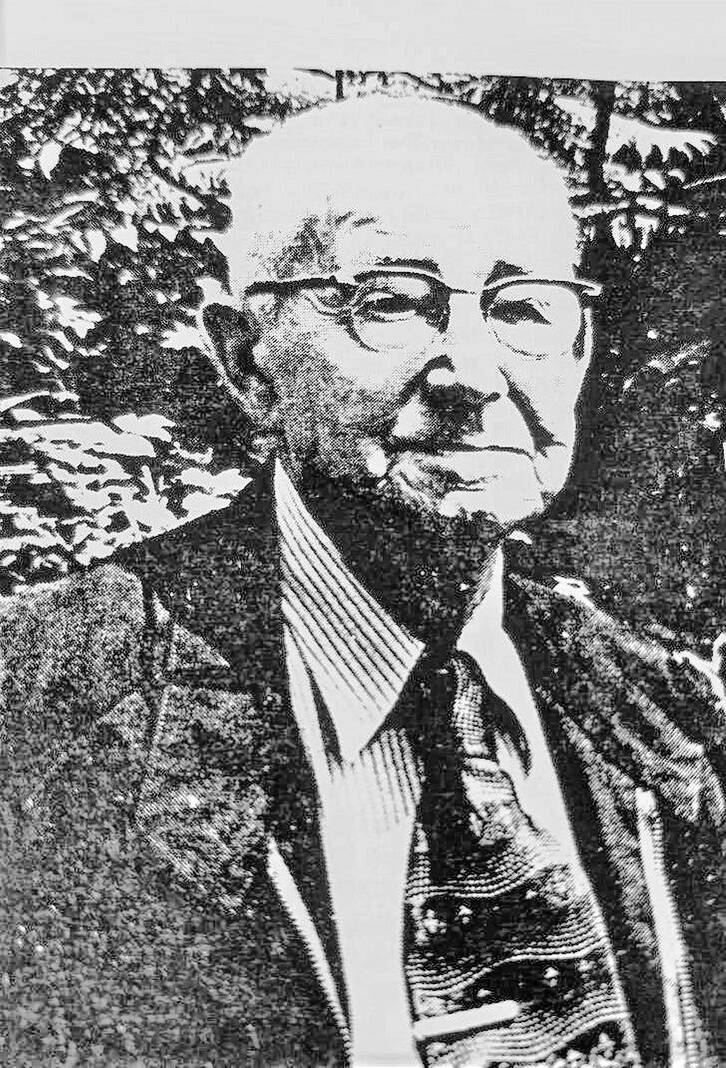
Jack Woods was a longtime Brown County resident and held many positions within the community, including post office worker, county clerk and carpenter.
Submitted
EDITOR’S NOTE: This story is part two of an interview by Dick Reed in 1974. This interview first appeared in the Brown County Democrat on Wednesday, July 10, 1974.
After Jack Woods married, he had a harness and shoe repair shop in the old hardware building, between Jerry’s Drive-In and the Nashville House.
For 22 years Jack lived in the old Calvin homestead across from the Singing Pines Motel on East Main Street. He and Lena bought the Woods’ present house in 1925, moved into it in 1927 and Jack has lived there ever since.
During World War I, Jack worked at the post office under postmaster John F. Bond, earning $30 a month. After about one year Richard Coffee — who bought the James Tilton store — paid Jack $50 a month to work for him. Coffee was also a funeral director. Ill health caused him to sell to a Chicago group, after which the hardware store became the Star Store.
Jack also has been a carpenter and farmer. He helped frame a house which he later bought. Jack also worked for Patterson located across the street from his present home.
When he was 14, he worked for 25-cents a day plus board and lodging for blacksmith Samuel Patterson, who owned a 10-acre farm including the ground where the Brown County Inn had been constructed. Jack also worked for Patterson on land at the head of Schooner Creek, farmed for $22 a month and “keep” up in Warren County and, later, in Howard County.
From 1928 to 1931 he served a four-year term as county clerk at Nashville. In 1932 development began at the state park and he worked there almost five years. He was there during the building of the lodge and 20 of the cottages, responsible for all building materials. The first cottage built, nearest the lodge, was used as his office.
In 1936, Jack was appointed as the county’s first director of public welfare. Previously, county commissioners had handled relief for persons in their former status.
Jack remembers that he had a huge loose-leaf book of regulations, which were changed almost daily. “None of the directors though, out of state, including me,” he says, “ever really knew what it was all about!”
Eventually there were 440 old-age welfare recipients and 30 aid-to-dependent children’s cases, plus several blind persons on his books. To help in the office he hired Fawn Clark and neighbor Fred King, brother of “Peanuts” King, who once ran the Star Store.
After nine years as welfare director Jack resigned on June 11, 1945, and returned to the post office, which needed an extra clerk because it was getting a higher federal rating. Clarence Robertson was postmaster then.
There was an interim period of about a month when he filled-in as substitute welfare director from a term of service in the Coastguard.
He was about five years with the postal service, this time. Then, late in 1949, the federal government began to require written examinations for postal employees and those who were 50 years old or older weren’t allowed to take the test — a discriminatory practice since rescinded.
Jack had passed his 65th birthday anniversary and was ready to retire.
“That second post office job,” he says, “is the last regular job I had.” Jack Woods is well aware of the many changes which have taken place during his lifetime in Brown County. And he approves of them. “They are all for the good,” he says. “I lived here when there was no fire department, no electric lights.”
“After I was married, they put in a generator run by gasoline engines. It was owned by the town and one man was hired to operate it, back of where the Gypsy Pot is. The engineer was Clyde McDonald, Ival’s cousin. We had power for the electric lights in town every night from dusk until 11 p.m.,” Jack continued.
More from Jack: “For a long time, there were no sidewalks or hard surfaced streets. When they came, there were people who objected to that. There are people that’ll object to anything. They just don’t want things changed. That’s why we didn’t get the railroad through here and it went to Helmsburg instead.
“I remember a lot from the old days but it’s hard to keep up with the way things are moving now. Last summer some tourists stopped me on the street and asked directions to the Rocking Horse. I had to say well, I’ve lived here well over 80 years, and I just didn’t know.
“Last July IU students did some interviews in Nashville and one lady, not born in the county, said that 11 years ago this was like a ghost town. I take issue with that. Nashville was never a ghost town. I can remember many businesses here. At least four grocery stores on Main Street, two general stores, two hardware stores — all back when I was a boy. Also at least four doctors in Nashville and many others around the county. There were five Livery Stables all at the same time.”
To be continued.
Submitted by Pauline Hoover, Brown County Historical Society

